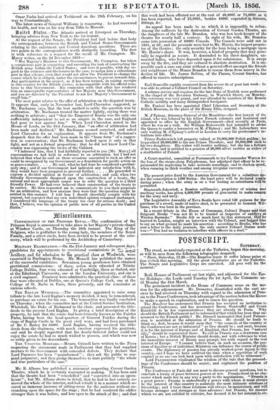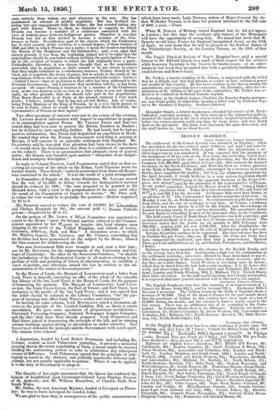Roth Houses of Parliament sat last night, and adjourned for
the Eas- ter Holidays—the Lords until Tuesday the 1st April, the Commons un- til Monday the 31st March. The prominent incident in the House of Commons arose on the mo- tion for the adjournment. Mr. DISRAELI, dissatisfied with the curt an- swer he had received on Thursday with regard to the admission of Prus- sia to the Peace Conferences, took advantage of the motion before the House to make a speech in explanation, and to renew his question. The Moniteur has announced that Prussia has accepted an invitation to attend the Conference; and has nominated Baron Manteuffel and Count Hatzfeldt to be her representatives : they are already in Paris. Why should the British Parliament not be informed of that which has been thus an- nounced to the French public ? Mr. Disraeli insinuated that Lord Palmer- ston is mortified at the admission of Prussia. He should be loath to think so ; first, because it would seem that "the councils of the country at the Conference are not so influential" as they should be ; and next, because it is for the interest of Europe and of England, that Prussia, her "natural ally," should be represented there. To call in Prussia was a dexterous ruse of Russia ; but a British Minister should decide, not with reference to what the immediate interest of Russia may prompt, but with regard to the real interest of Europe. "I cannot believe that, on such an occasion, the pas- sions of families or of individual Ministers can influence the course of public events. The diplomacy of passion has already worked great injury to this country, and I hope we have outlived the time when a repetition of such conduct as no one can look back upon with satisfaction will be witnessed." Lord PALMERSTON vindicated the wisdom of the rule that the proceed- ings of the Conference should be secret; and explained the position of Prussia.
The Conference at Paris did not meet to discuss general questions, but to conclude a treaty of peace between powers at war. Prussia stood in no cha- racter which made her in any way a party to the negotiations. "Prussia is a great power ; Prussia is undoubtedly a power with whom it must always be the interest of this country to maintain the most intimate relations of friendship ; and I trust those relations will always be maintained, and will become stronger and stronger as time advances : but Prussia, for reasons which we are not entitled to criticize, has deemed it for her interest to ab- stain entirely from taking any part whatever in the war. She has maintained an attempt at perfect neutrality.. She has declined en- tering into any engagements with the Allies; she has avoided taking any part with Russia. There is, then, no character or capacity in which Prussia can become a member of a conference assembled with the view of making peace between belligerent parties. Therefore it was that Prussia was not at first invited to become a member of the Con- ference at Paris. Nevertheless, part of the objects which the Conference has in view consists of the revision, to a certain degree, of those treaties of 1840 and 1841 to which Prussia was a party—I mean the treaties regulating the Straits of the Bosphorus and the DardaneLles ; and, even upon that narrow ground, it was from the beginning judged not to be right that the negotiations should be concluded without inviting the participation of Prus- sia in the revision of treaties to which she had originally been a party. Undoubtedly, therefore, it was always thought that, as the negotiations proceeded, and in proportion as there seemed to be any reason to expect that they might terminate in a satisfactory. manner, Prussia should be in- vited, not to negotiate the treaty of peace but to accede to the result of the negotiations of those who are more directly interested in the matter. I believe —indeed I know—that an invitation to that effect has been addressed to the Prussian Government; and I presume that invitation will be, or has been, accepted. Of course Prussia is desirous to be a member of the Conference now, as she was desirous to be so even at a time when it was not thought right, on other grounds, that she should take part in the negotiations. That Baron Manteuffel is at Paris at the present moment I very much doubt L I believe, indeed, that he has not yet left Berlin ; but, of course, being Prime Minister of the King of Prussia, he is a very likely person to be sent to Paris, where he would be associated with Baron Ilatzteldt, the representative of Prussia in that capital."
Two other questions of interest were put in the course of the evening. Mr. LAYARD desired information with respect to expeditions in progress or in contemplation against Persia. Mr. VERNON Ss= said that two armed ships had been sent to protect the British Resident in Bushire ; but he declined to state anything further. He had heard, but he had no positive information, that Persia had despatched an expedition to Herat. He trusted that when the Persian Government sees] what is passing in Europe, it will consent to an amicable settlement with England. Mr. GLAns•rcern said he was glad that attention had been drawn to the facts —it would show the Government that there is a sentiment of uneasiness en the subject. There is no presumption that adequate cause of insigni-
ficant exists ; the dispute was founded upon matters "altogether of an and trumpery description."
In reply to Colonel FRENCH, Lord PALusearox stated that on first re- ceiving an account of the attack on the Redan, Lord Panmure wrote for further details. Those details "entirely exonerated from blame all the per- sons concerned in the attack." It was the result of a joint arrangement.
In Committee of Supply on the Army Estimates' Mr. LAYA.RD moved that the vote of 25,400/. to defray rewards for distinguished services should be reduced by 100/., "the sum proposed to be granted to Sir Richard Airey, with a view to the postponement of the same until after the result of the Commission of Inquiry be known." Mr. PEEL said, to refuse the vote would be to prejudge the question.—Motion negative,1 by 82 to 9.
.,211r,Sroortan moved to reduce the vote of 32,096/. Jae- 7,ilmo;,1,81li and Chelsea Hospitals by 501., the amount paid t; Roman Catholic priests.—Negatived by 89 to 15.
On the motion of Mr. Lowe, a Sste't Committee was appointed to report to the House "upon the esneral matters referred to the Commis-
sioners appointed by her esty to inquire into local charges upon shipping in the ports d the 101 nited Kingdom and islands of Jersey, Guernsey, Alderney, Sark, and Man." A discussion arose in which Mr. MU.,Prra GuisoN, Mr. LINDSAY, and Mr. COBDEN, contending that ze_sleZision had been pronounced on the subject by the House, blamed The Government for withdrawing the bill.
Two new Government Bills were brought in and read a first time ; one by Mr. Bouveare, for the improvement of the University and Col- leges of Cambridge ; the other by the Soracrron-GENERAL, to abolish the jurisdiction of the Ecclesiastical Courts in all matters relating to the ,probate of wills and granting of letters of administration, to establish a court of probate, and otherwise amend the law in relation to the ad- ministration of the estates of deceased persons."
In the House of Lords, the Marquis of LANSDOWNE read a letter from Lady Truro to himself, conveying an offer of the whole of the valuable law library of the late Lord Truro to the House of Lords, for the purpose of honouring his memory. The Marquis of LANSDOWNE, Lord LYN-p- itons; the LORD CHANCELLOR, the Earl of DERBY, and Earl GREY, bore testimony to the merits of the late Lord Truro ; and it was agreed that the letter should be referred to the Library Committee, "for the pur- pose of carrying into effect Lady Truro's wishes and intentions." In moving for some returns, Lord MONTEAGLE raised a discussion ad- verse to the principle of the Limited Liability Bill, as likely to excite speculation. He gave some specimens of preposterous speculations— Universal Purveying Company, National Newspaper League Company, -and the like—that have been already proposed. Lord OVERSTONE and Earl GREY joined in denouncing the principle of the bill, and in uttering solemn Warnings against giving to speCulation an undue stimulus. Earl 'GRANVILLE defended the principle and the Government with much spirit. The returns were ordered.



























 Previous page
Previous page